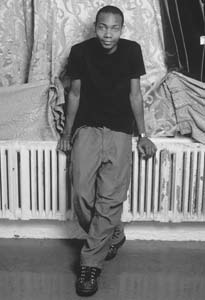Brain Teaser
DJ Spooky's deconstruction
By Amanda Nowinski
ASIDE FROM ONE teenage raver couple in huge pants and matching baseball caps, no one is dancing at the DJ Spooky show. Some heads are nodding and a few knees are bending, but hips do not sway and sweat does not glisten. "Now I'm gonna play a bass solo," Spooky announces as he strums a repetitive lick on his stand-up instrument. He dashes back to the turntables for a series of quick scratches and then interjects a prerecorded tublah sound.
Heaving in and out with the irregularity of an emphysemic metronome, the throaty rhythm crescendos from the speakers and engulfs the now mesmerized crowd. "Wow, this is too weird!" exclaims the Swedish tourist behind me.
The beat transforms into jagged drum 'n' bass, and all eyes are still fixed on Spooky as he slowly plucks a distorted marimba. Rhythmic dissonance flows forth like a clumsy punk-rock ballerina, and the audience appears stunned because (A) they know they should be (esoteric electronic music is de rigueur), (B) this stuff is remarkably "weird" and (C) they are witnessing the rise of a subculture's music into a multifaceted art movement.
As Spooky continues to build a nondanceable assemblage of disparate tones and beats, archaic notions of the DJ as the happy-go-lucky automaton in gold chains and an Adidas sweatsuit are immediately dispelled. In other words, if all you want is to get your groove on and work the dance floor like it was Studio 54, you'll have to leave the premises.
The DJ is no longer just a jukebox; he is an abstract, freeform artist whose medium consists of one hefty hard drive, two Technic turntables and the infinite palette of inorganic sound. He constructs meaning--both intuitive and conscious--out of the mundaneness of technology and doesn't care how groovy you want to feel.
"I'm coming to the DJ thing as a series of experiments," explains the New York-based Spooky, a.k.a. Paul Miller. "I'm creating a space where music can be a place of exploration and where sound can be culturally nomadic. I make these collages--'neuro-physiological chop ups'--and use turntables to express myself. This is my digital exorcism of 20th-century chaos."
Riddim Warfare, Miller's newest album, is testimony to his conceptual approach. Full of strange samples, quirky, pointed narratives and harder-edged hip-hop and jungle beats, the tracks fuse together with a moody uneasiness--this is music that will move, not soothe your mind.
"I'm being a trickster with sound," he admits. "I'm just fucking around, basically--I love playing with chaos." While most electronic musicians create music that has dramatic resolution of melody and beat, Miller provides the antithesis and warns, "If you want McDonalds, you'll just have to go there and get it. My music is a critique of dance music--I question the establishment of that genre."
INNOVATOR OF the "illbient" sound--ambient music with a rougher, urban twist--Miller began his "musical atomization" in 1992 when he moved to New York after graduating with a dual degree in philosophy and French literature from Bowdoin College in Maine. "When I arrived in New York," he recalls, "I noticed that everyone had their own 'box.' I didn't fit in. I couldn't get gigs writing or DJ-ing--so I had to start my own club called Abstract. I started it as a party for other artists and writers, and it has really evolved. This past May, we did a project called Sound Lab and over 4,000 people showed up."
A columnist for Paper magazine and the author of Flow My Blood the DJ Said--a theoretical look at youth culture and electronic music--Miller has gained equal attention for his literary skills. Poetic ramblings and freestyle exposés, Miller's writing is loaded with references to the postmodernist pantheon, such as Walter Benjamin and Roland Barthes.
Although these references seem to underscore his earnest belief in the importance of grounding electronic music in the intellectual, he is often accused of pretension overkill. "I am not overintellectualizing music," he insists. "Everything is intellectual. Taking a shower and deciding to use a particular bar of soap is an intellectual decision. Music just can't speak for itself--that's ridiculous."
Regardless, it's quite possible that Miller is on his way to joining the ranks of his brainy idols. His cerebral approach to sound has led to collaborations with some of the world's most renowned composers, including Riuyichi Sakomoto and Philip Glass, with whom he is currently recording a duet album.
"I recently did a performance with Pauline Oliveri [a feminist composer who began writing electronic music in 1945] at Columbia University. We decided to do our piece in the library. Where books should have been, our music took their place. Sound became the only text."
Move over, postmodern, and come join the postpresent.
Copyright © Metro Publishing Inc. Maintained by Boulevards New Media.
![]()
 Digital Exorcist: DJ Spooky is no longer just a jukebox; he is a free-form artist whose medium consists of one hard drive, two turntables and the infinite palette of inorganic sound.
Digital Exorcist: DJ Spooky is no longer just a jukebox; he is a free-form artist whose medium consists of one hard drive, two turntables and the infinite palette of inorganic sound.
"This is music made from fragments of the world ..."
--DJ Spooky
DJ Spooky plays on Thursday (9pm) at Palookaville, 1133 Pacific Ave., SC. Tickets cost $13/$11. For info, call 454-0600.
From the October 29-November 4, 1998 issue of Metro Santa Cruz.
![[MetroActive Music]](/music/gifs/music468.gif)